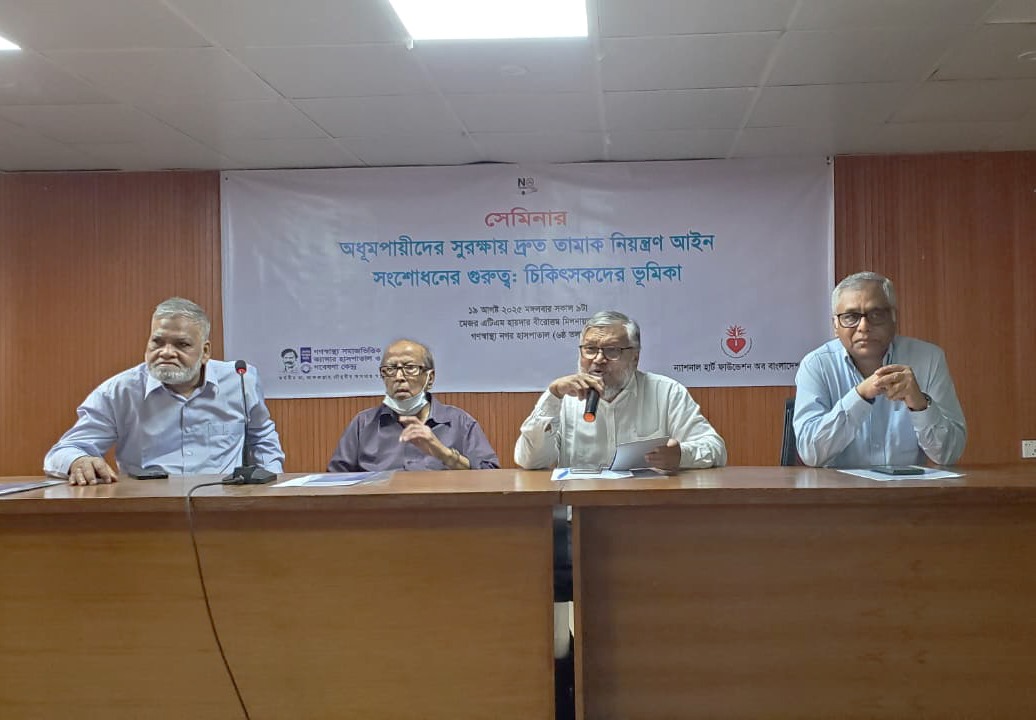Physicians from Gonoshasthaya Nagar Hospital and Gonoshasthaya Community-Based Cancer Hospital have called for immediate enactment of the proposed amendments by the Health Ministry to the Tobacco Control Act and the cancellation of the government’s decision to hold meetings with tobacco companies.
The call came at a seminar titled “The Importance of Amending the Tobacco Control Law to Protect Non-Smokers: The Role of Physicians”, held on Friday morning at the ATM Haider Bir Uttam Auditorium of Gonoshasthaya Nagar Hospital in Dhaka.
The programme was presided over by Professor Dr Habibullah Talukder Raskin, project coordinator of Gonoshasthaya Community-Based Cancer Hospital, while the keynote speech was delivered by Professor Dr Sohel Reza Choudhury, head of Epidemiology and Research at the National Heart Foundation Hospital and Research Institute.
Speakers said the involvement of tobacco companies in discussions on the law’s amendment is unacceptable and constitutes a direct breach of Article 5.3 of the WHO Framework Convention on Tobacco Control (FCTC). They urged the government to reject tobacco firms’ opinions under the guise of stakeholder meetings and to approve the Health Ministry’s proposed amendments without delay.
In his keynote, Dr Sohel Reza Choudhury noted that over 161,000 Bangladeshis die annually from tobacco-related diseases, while 400,000 more are left disabled. Around 38.4 million adults are exposed to second-hand smoke every day. “Further delay in amending the Tobacco Control Act is equal to neglecting public health,” he said, stressing that government engagement with tobacco companies poses a “serious threat” to health policy.
Dr Habibullah Talukder Raskin said, “On average, 442 people die in Bangladesh every day due to tobacco. Any delay in amending the law is unacceptable, and the government must take responsibility.” He added that Bangladesh, despite being an early signatory of the WHO FCTC, is now considering inputs from tobacco firms, which he termed “anti-public interest”.
Highlighting the legacy of Gonoshasthaya founder Dr Zafrullah Chowdhury, who banned smokers from applying to his institutions as early as the 1970s, Dr Raskin reaffirmed Gonoshasthaya’s continued commitment to tobacco control efforts.
The seminar emphasised six key amendments proposed by the Health Ministry: removing Designated Smoking Areas (DSAs) to make all public places and transport 100% smoke-free; banning point-of-sale displays of tobacco; prohibiting tobacco companies’ CSR activities; protecting youths from e-cigarettes and emerging tobacco products; increasing pictorial health warnings from 50% to 90%; and banning the sale of loose sticks and unpackaged tobacco products.
Present also at the seminar were Professor Dr Md Khorshed Alam, head of Oncology at Gonoshasthaya Medical College; Dr Md Saeed-uz-Zaman, assistant professor at Gonoshasthaya Nagar Hospital; Professor Dr Mujibul Haque; Professor Akram Hossain; Dr Aruna Sarkar, coordinator of the National Heart Foundation’s Tobacco Control Project; Senior Communications Officer Abu Zafar, among other physicians and health professionals.


